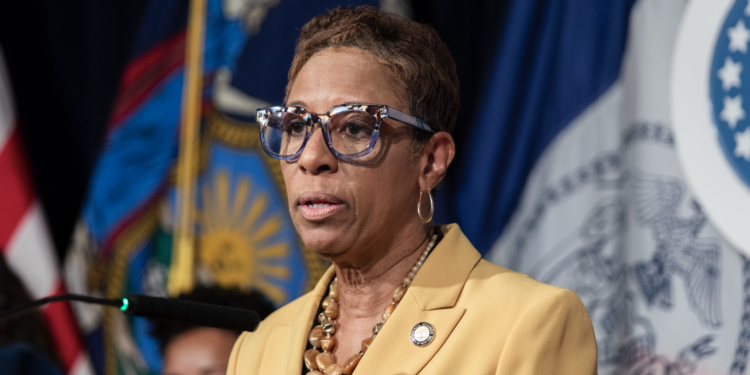New York City Council Speaker Adrienne Adams is getting ready for a possible legal dispute with Mayor Eric Adams and the Trump Administration. This follows the City Council’s decision on Thursday, April 10th, which gave her permission to act on the city’s sanctuary laws. The resolution empowers Speaker Adams to sue both the mayor and Trump over an executive order that lets federal agencies, such as Immigration and Customs Enforcement (ICE), reopen offices on Rikers Island.
First Deputy Mayor Randy Mastro signed the executive order on Tuesday, which allows federal officials to go after violent criminal gangs operating within the city’s jail system. However, opponents argue that it goes against New York City’s sanctuary laws, which limit local support for federal immigration enforcement. These laws were created in 2014 to stop city jails from helping ICE with deportations.
Speaker Adams has voiced strong disapproval of the order, arguing that it harms the city’s ability to safeguard immigrant populations. She remarked, “This is about the mayor fulfilling his end of the bargain to Trump, selling out New Yorkers in exchange for the dismissal of his federal corruption case.” Several City Council members echo these worries, perceiving the executive order as a threat to the city’s sanctuary laws.
Mastro, however, defended the executive order by stressing that it is solely targeted at criminal investigations and does not involve civil immigration enforcement. “It is only for criminal enforcement and expressly excludes civil matters,” he said at a press conference.
Even with the mayor’s reassurances, Speaker Adams and other critics continue to feel uneasy, doubting whether the order might lead to an increased partnership with ICE. In light of the mayor’s recusal, which gives authority to Mastro, Speaker Adams remarked, “The executive order, make no mistake about it, looks like it was brought about because of the relationship the mayor has with the Trump administration.”
The City Council has not yet initiated a lawsuit, but the resolution empowers Speaker Adams to pursue legal action if required. Civil rights organizations, such as the Legal Aid Society, are also considering their own legal options.










